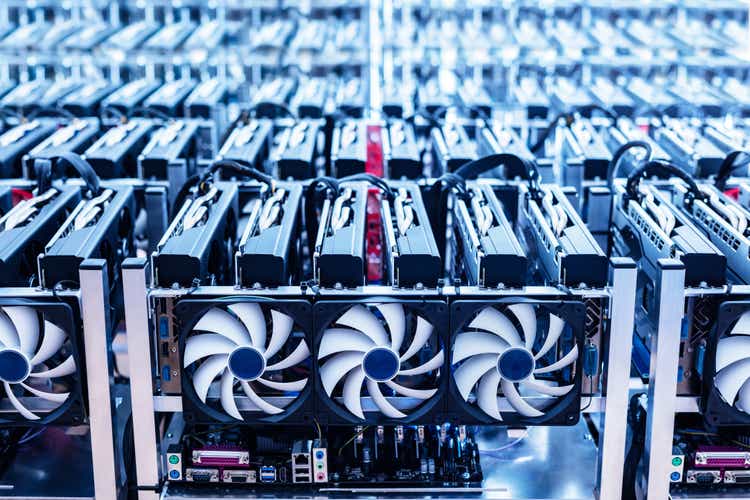
NiseriN
As bitcoin (BTC-USD) miners pivot toward artificial intelligence to diversify revenue streams, Wall Street’s optimism is rising, raising the question whether investors should, too, be bullish.
With the April bitcoin (BTC-USD) halving event slashing the reward for mining BTC by 50%, making the mining business more competitive with narrower profit margins, a number of mining companies have started to use some of their data centers to host high-performance computing machines to unlock a new and potentially bigger revenue stream.
“The synergy is simple: AI companies need energy, and bitcoin miners have it,” said Matthew Sigel, head of Digital Assets Research at VanEck. “As the market values the growing AI/HPC data center market, access to power—especially in the near term—is commanding a premium.”
Core Scientific (CORZ) is an early adopter and investors have been rewarding its AI shift, with shares up over 810% this year, easily trouncing bitcoin’s (BTC-USD) 63% climb. In June, the miner signed a 12-year hosting contract with Nvidia-backed hyperscaler CoreWeave, and later expanded the agreement in August for a total revenue opportunity of $6.7B. Core Scientific expects to deliver about 382 megawatts of infrastructure to CoreWeave by mid-2026, with an additional 118 megawatts potentially coming from other Core Scientific locations.
Jefferies analyst upgraded (CORZ) shares Monday to Buy on the view that it’s well positioned to capture AI demand. Analyst Jonathan Petersen said he expects the company to diversify its tenant base to hyperscalers beyond CoreWeave, with management seen making further announcements by the end of the year.
The company “could soon become one of the U.S.’s largest data center operators if CoreWeave exercises up to 118 MW of further expansions,” Sigel contended in an August report.
Since miners generally have weak balance sheets, usually driven by excessive debt or too much debt/equity issuance, the AI/HPC shift should be lauded, Sigel noted, as “customers are willing to fund the capex, potentially providing a lower cost of capital for the bitcoin miners to strike their next energy deal.”
He estimated that if publicly traded bitcoin (BTC-USD) miners were to shift 20% of their energy capacity to AI and HPC by 2027, total additional annual profits could surpass an average of $13.9B per year of 13 years, underscoring the immense expansion opportunity for these companies who otherwise may be struggling financially.
Youwei Yang, chief economist at BIT Mining, agrees that the transition to AI/HPC “is a promising direction for bitcoin miners, as power infrastructure and data center operations are core strengths for them,” citing benefits such as “steady income, enhanced asset utilization, and reduced exposure to BTC price swings.”
There are risks, however, with the main one being “the upfront investment in [graphics processing units] and establishing high-quality data centers, which require backup power, high-speed stable internet, and a clean, low-dust environment,” he added.
Miners sticking to crypto and not venturing into AI is akin to “clinging to a sinking ship,” said David Materazzi, CEO of automated trading platform Galileo FX. “The real risk is in doing nothing, watching competitors diversify while clinging to old dreams. Hesitation is just another word for missed opportunity.”
Miners either exploring or already tackling AI/HPC include: Bitdeer (BTDR), Bit Digital (BTBT), Bitfarms (BITF), Cipher Mining (CIFR), Core Scientific (CORZ), Hive Digital (HIVE), Hut 8 (HUT), Iris Energy (IREN), TeraWulf (WULF). Meanwhile, Riot Platforms (RIOT), MARA (MARA) and Cleanspark (CLSK) have yet to announce any plans.
